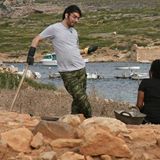
Graduate case studies
Even though many of our graduates will have progressed in their careers since completing a case study, they are still of interest to students who wish to gain an understanding of the world of work.
My responsibility is the supervision of the developments that the Company, on behalf of the State, carry out. In a sense, I have two "masters" - on the one hand, I obey the Company who pay me but who have different expectations (i.e. they only want to get the job done too fast and often to the detriment of archaeology); on the other hand, I obey the rules of the Ministry of Culture by keeping a discreet eye on workers and attending the whole process of the construction in case I spot a votive offering or something similar. My work schedule is eight hours a day, five days a week (I sometimes work on Saturdays too). My position is hugely important, in that, as archaeologists told me several times, I am "the eyes of Archaeology". I represent the scientific part of the excavation and this offers me satisfaction and emotional fulfilment.
I wake up at 6:00 am, and arrive at the spot at 7:30 am. My job gives me considerable freedom but only in theory, because I have to be alert at all times in case a finding surfaces. At 3:30pm I prepare to leave and go home. Every Friday I send a report to the Head of the Archaeological Ephorate as well as to the local archaeologist who is responsible for the area, just to inform them about the progress that has been done. My report covers not only significant findings, but also minor details, such as whether the soil changes colour or becomes rocky, and generally speaking, whatever might indicate that something is unusual. In case you find an artefact, you always take it to the local museum and inform archaeology.
Archaeologists still have this feeling of gratitude whenever they discover an important finding. Archaeologists, in a good sense and just like in any job, rank themselves according to how many figurines and ancient coins they have discovered. I personally have discovered coins and, believe me, it feels good!
There is the element of disappointment in cases whenever we go back to the laboratory and processing reveals that the finding looks important but it actually is not. Even in this case, however, you feel that, just because there is this experimental element in the laboratory, Archaeology is more scientific than some people want to believe.
In between my archaeology studies there were several gaps. One reason was unemployment, the other reason being my craving for knowledge. Specifically, after my BA at Manchester University (Archaeology and Social Sciences, 2000-2003) I acquired the PG Certificate in International Business from Manchester Business School (2003-2004). I then undertook an MA in Archaeology from Sheffield University (2004-2005), and then attended the International Graduate Programme at Stockholm University, Sweden (2006-2007). Between 2006-2009 I was doing a PhD at Manchester University but, although I wrote my 1st chapter and upgraded from MPhil to PhD status, I had to interrupt due to financial difficulties.
I was unemployed for quite some time. Once I found my first job (14/09/2018 - 31/01/2019), all these seemingly irrelevant courses I mentioned before created a kind of interdisciplinary mindmap, which helped me make sense of the evidence and look at the big picture, which is what archaeology is about really.
After fulfilling my military obligations (2009-2010), I took the CPE from the British Council (2014), and after that I received the TKT (Teaching Knowledge Test), specifically the course KAL (Knowledge About Language), which was immensely difficult (2014). I achieved 3/4 on this exam. I also attended the Sanisera archaeological field school in Menorca, Spain (2013).
I am considering undertaking a PhD in social and political archaeology. This will allow me to broaden my horizon across the social and political processes behind Archaeology. I also have an interest in the Philosophy of Science, so we will see. Importantly, archaeology offers a wide range of possible openings, and several possibilities exist.
Archaeology asks many questions about where do we come from and where we are heading. These questions cannot, at least in prehistory that is my area, be answered but (1) as my professor at Sheffield told me, you learn not only from the answers but also from the questions; and (2) you often do get some answers - but again these bring new questions, which is why Archaeology has developed such sophisticated interpretive "keys", as processual, postprocessual, cognitive, contextual archaeologies, just to name a few!
Thank you for the opportunity that you gave me to talk about these issues. Good luck!!
Last updated: 22 Aug 2019

